新概念英语第二册第十一课课文详解
- 格式:docx
- 大小:40.28 KB
- 文档页数:7
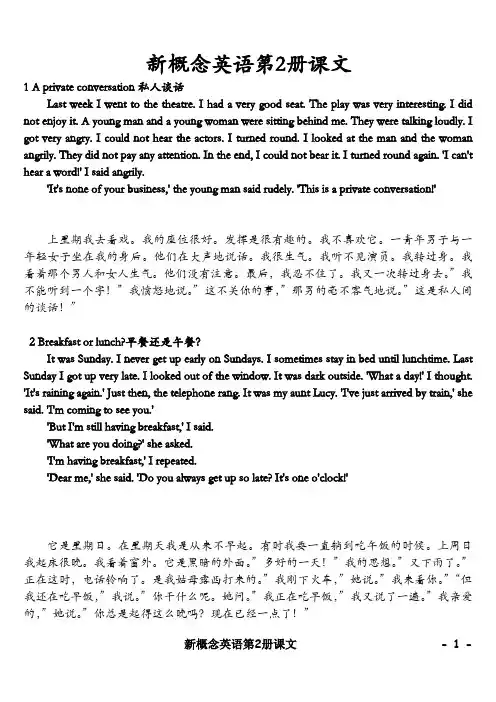
新概念英语第2册课文1 A private conversation私人谈话Last week I went to the theatre. I had a very good seat. The play was very interesting. I did not enjoy it. A young man and a young woman were sitting behind me. They were talking loudly. I got very angry. I could not hear the actors. I turned round. I looked at the man and the woman angrily. They did not pay any attention. In the end, I could not bear it. I turned round again. 'I can't hear a word!' I said angrily.'It's none of your business,' the young man said rudely. 'This is a private conversation!'上星期我去看戏。
我的座位很好。
发挥是很有趣的。
我不喜欢它。
一青年男子与一年轻女子坐在我的身后。
他们在大声地说话。
我很生气。
我听不见演员。
我转过身。
我看着那个男人和女人生气。
他们没有注意。
最后,我忍不住了。
我又一次转过身去。
”我不能听到一个字!”我愤怒地说。
”这不关你的事,”那男的毫不客气地说。
”这是私人间的谈话!”2 Breakfast or lunch?早餐还是午餐?It was Sunday. I never get up early on Sundays. I sometimes stay in bed until lunchtime. Last Sunday I got up very late. I looked out of the window. It was dark outside. 'What a day!' I thought. 'It's raining again.' Just then, the telephone rang. It was my aunt Lucy. 'I've just arrived by train,' she said. 'I'm coming to see you.''But I'm still having breakfast,' I said.'What are you doing?' she asked.'I'm having breakfast,' I repeated.'Dear me,' she said. 'Do you always get up so late? It's one o'clock!'它是星期日。
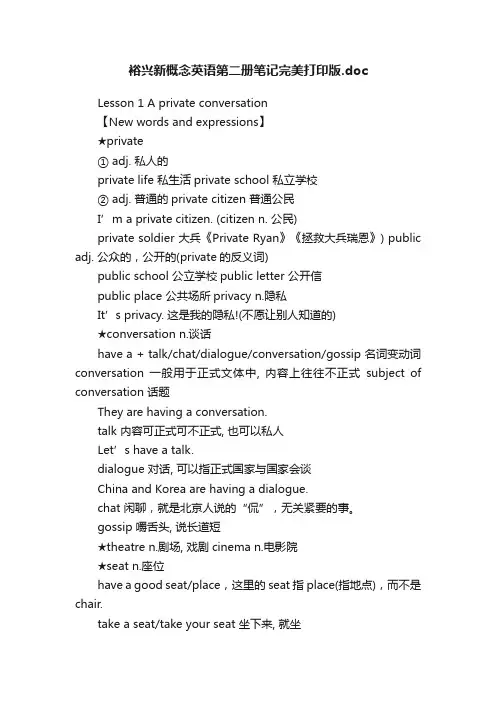
裕兴新概念英语第二册笔记完美打印版.docLesson 1 A private conversation【New words and expressions】★private① adj. 私人的private life 私生活private school 私立学校② adj. 普通的private citizen 普通公民I’m a private citizen. (citizen n. 公民)private soldier 大兵《Private Ryan》《拯救大兵瑞恩》) public adj. 公众的,公开的(private的反义词)public school 公立学校public letter 公开信public place 公共场所privacy n.隐私It’s privacy. 这是我的隐私!(不愿让别人知道的)★conversation n.谈话have a + talk/chat/dialogue/conversation/gossip 名词变动词conversation 一般用于正式文体中, 内容上往往不正式subject of conversation 话题They are having a conversation.talk 内容可正式可不正式, 也可以私人Let’s have a talk.dialogue 对话, 可以指正式国家与国家会谈China and Korea are having a dialogue.chat 闲聊,就是北京人说的“侃”,无关紧要的事。
gossip 嚼舌头, 说长道短★theatre n.剧场, 戏剧cinema n.电影院★seat n.座位have a good seat/place,这里的seat指place(指地点),而不是chair.take a seat/take your seat 坐下来, 就坐Is the seat taken? 这个位置有人吗?请坐的3种说法:Sit down, please. (命令性)Take your seat, please.Be seated, please. (更礼貌)作为动词的seat与sit的区别sit(sat,)vi. 就座He is sitting there.他坐在那儿。
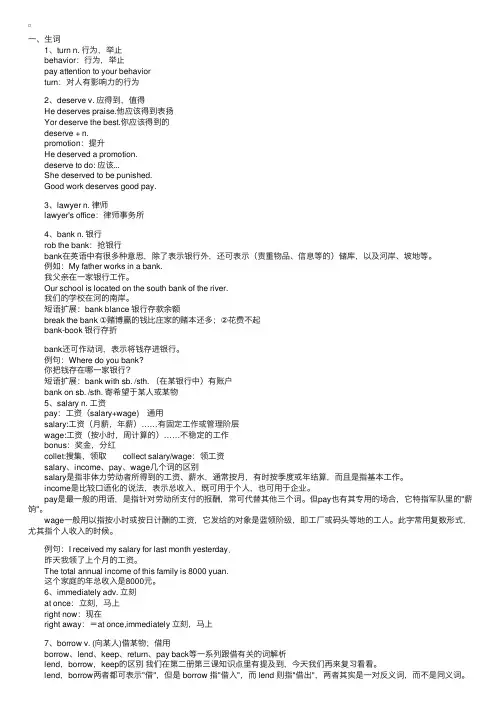
⼀、⽣词 1、turn n. ⾏为,举⽌ behavior:⾏为,举⽌ pay attention to your behavior turn:对⼈有影响⼒的⾏为 2、deserve v. 应得到,值得 He deserves praise.他应该得到表扬 Yor deserve the best.你应该得到的 deserve + n. promotion:提升 He deserved a promotion. deserve to do: 应该... She deserved to be punished. Good work deserves good pay. 3、lawyer n. 律师 lawyer's office:律师事务所 4、bank n. 银⾏ rob the bank:抢银⾏ bank在英语中有很多种意思,除了表⽰银⾏外,还可表⽰(贵重物品、信息等的)储库,以及河岸、坡地等。
例如:My father works in a bank. 我⽗亲在⼀家银⾏⼯作。
Our school is located on the south bank of the river. 我们的学校在河的南岸。
短语扩展:bank blance 银⾏存款余额 break the bank ①赌博赢的钱⽐庄家的赌本还多;②花费不起 bank-book 银⾏存折 bank还可作动词,表⽰将钱存进银⾏。
例句:Where do you bank? 你把钱存在哪⼀家银⾏? 短语扩展:bank with sb. /sth. (在某银⾏中)有账户 bank on sb. /sth. 寄希望于某⼈或某物 5、salary n. ⼯资 pay:⼯资(salary+wage) 通⽤ salary:⼯资(⽉薪,年薪)……有固定⼯作或管理阶层 wage:⼯资(按⼩时,周计算的)……不稳定的⼯作 bonus:奖⾦,分红 collet:搜集,领取 collect salary/wage:领⼯资 salary、income、pay、wage⼏个词的区别 salary是指⾮体⼒劳动者所得到的⼯资、薪⽔,通常按⽉,有时按季度或年结算,⽽且是指基本⼯作。
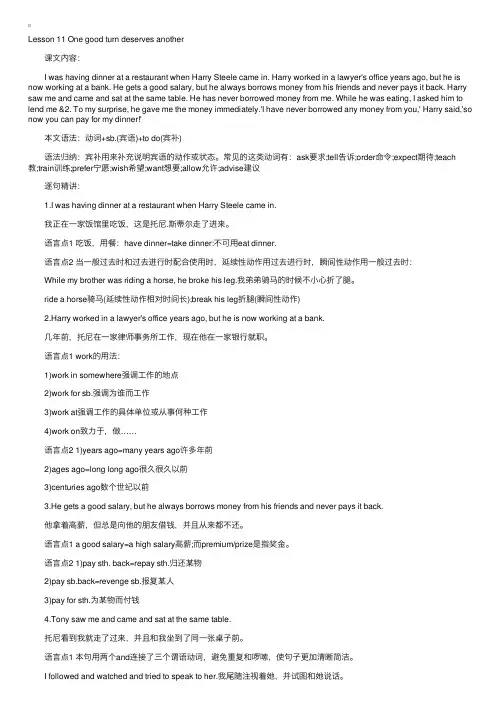
Lesson 11 One good turn deserves another 课⽂内容: I was having dinner at a restaurant when Harry Steele came in. Harry worked in a lawyer's office years ago, but he is now working at a bank. He gets a good salary, but he always borrows money from his friends and never pays it back. Harry saw me and came and sat at the same table. He has never borrowed money from me. While he was eating, I asked him to lend me &2. To my surprise, he gave me the money immediately.'I have never borrowed any money from you,' Harry said,'so now you can pay for my dinner!' 本⽂语法:动词+sb.(宾语)+to do(宾补) 语法归纳:宾补⽤来补充说明宾语的动作或状态。
常见的这类动词有:ask要求;tell告诉;order命令;expect期待;teach 教;train训练;prefer宁愿;wish希望;want想要;allow允许;advise建议 逐句精讲: 1.I was having dinner at a restaurant when Harry Steele came in. 我正在⼀家饭馆⾥吃饭,这是托尼.斯蒂尔⾛了进来。
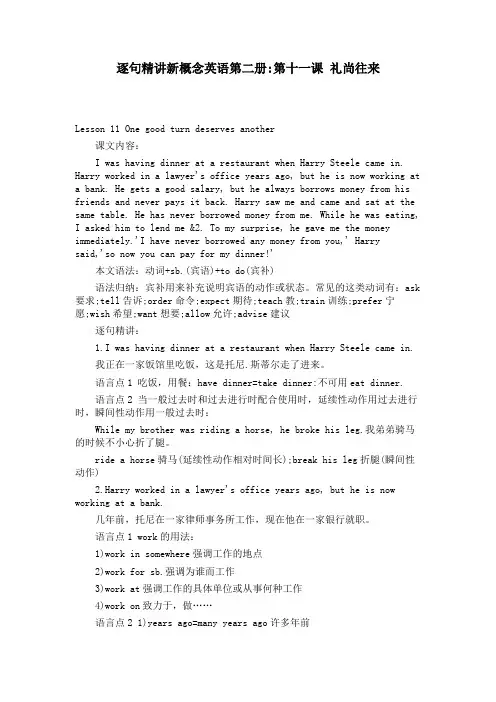
逐句精讲新概念英语第二册:第十一课礼尚往来Lesson 11 One good turn deserves another课文内容:I was having dinner at a restaurant when Harry Steele came in. Harry worked in a lawyer's office years ago, but he is now working at a bank. He gets a good salary, but he always borrows money from his friends and never pays it back. Harry saw me and came and sat at the same table. He has never borrowed money from me. While he was eating, I asked him to lend me &2. To my surprise, he gave me the money immediately.'I have never borrowed any money from you,' Harrysaid,'so now you can pay for my dinner!'本文语法:动词+sb.(宾语)+to do(宾补)语法归纳:宾补用来补充说明宾语的动作或状态。
常见的这类动词有:ask 要求;tell告诉;order命令;expect期待;teach教;train训练;prefer宁愿;wish希望;want想要;allow允许;advise建议逐句精讲:1.I was having dinner at a restaurant when Harry Steele came in.我正在一家饭馆里吃饭,这是托尼.斯蒂尔走了进来。
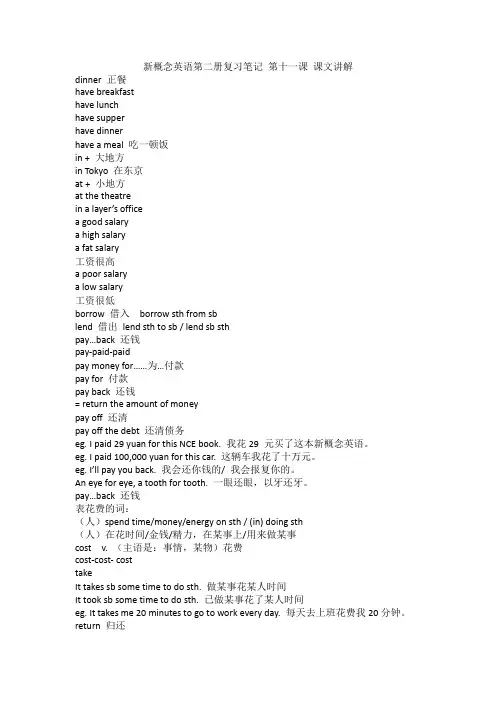
新概念英语第二册复习笔记第十一课课文讲解dinner 正餐have breakfasthave lunchhave supperhave dinnerhave a meal 吃一顿饭in + 大地方in Tokyo 在东京at + 小地方at the theatrein a layer’s officea good salarya high salarya fat salary工资很高a poor salarya low salary工资很低borrow 借入borrow sth from sblend 借出lend sth to sb / lend sb sthpay…back 还钱pay-paid-paidpay money for……为…付款pay for 付款pay back 还钱= return the amount of moneypay off 还清pay off the debt 还清债务eg. I paid 29 yuan for this NCE book. 我花29 元买了这本新概念英语。
eg. I paid 100,000 yuan for this car. 这辆车我花了十万元。
eg. I’ll pay you back. 我会还你钱的/ 我会报复你的。
An eye for eye, a tooth for tooth. 一眼还眼,以牙还牙。
pay…back 还钱表花费的词:(人)spend time/money/energy on sth / (in) doing sth(人)在花时间/金钱/精力,在某事上/用来做某事cost v. (主语是:事情,某物)花费cost-cost- costtakeIt takes sb some time to do sth. 做某事花某人时间It took sb some time to do sth. 已做某事花了某人时间eg. It takes me 20 minutes to go to work every day. 每天去上班花费我20分钟。
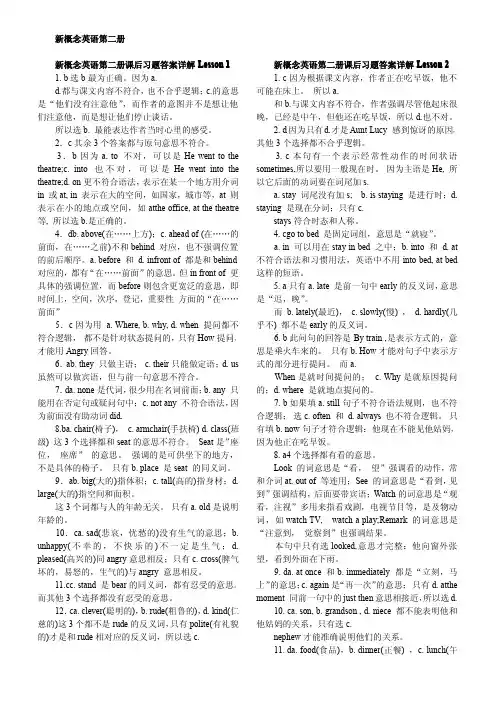
新概念英语第二册新概念英语第二册课后习题答案详解Lesson11.b选b最为正确。
因为a.d.都与课文内容不符合,也不合乎逻辑;c.的意思是“他们没有注意他”,而作者的意图并不是想让他们注意他,而是想让他们停止谈话。
所以选b.最能表达作者当时心里的感受。
2.c其余3个答案都与原句意思不符合。
3.b因为a.to不对,可以是He went to the theatre;c.into也不对,可以是He went into the theatre;d.on更不符合语法,表示在某一个地方用介词in或at,in表示在大的空间,如国家,城市等,at则表示在小的地点或空间,如atthe office,at the theatre 等,所以选b.是正确的。
4.db.above(在……上方);c.ahead of(在……的前面,在……之前)不和behind对应,也不强调位置的前后顺序。
a.before和 d.infront of都是和behind 对应的,都有“在……前面”的意思。
但in front of更具体的强调位置,而before则包含更宽泛的意思,即时间上,空间,次序,登记,重要性方面的“在……前面”5.c因为用 a.Where,b.why,d.when提问都不符合逻辑,都不是针对状态提问的,只有How提问,才能用Angry回答。
6.ab.they只做主语;c.their只能做定语; 虽然可以做宾语,但与前一句意思不符合。
7.da.none是代词,很少用在名词前面;b.any只能用在否定句或疑问句中;c.not any不符合语法,因为前面没有助动词did.8.ba.chair(椅子),c.armchair(手扶椅)d.class(班级)这3个选择都和seat的意思不符合。
Seat是”座位,座席”的意思。
强调的是可供坐下的地方,不是具体的椅子。
只有b.place是seat的同义词。
9.ab.big(大的)指体积;c.tall(高的)指身材;d. large(大的)指空间和面积。
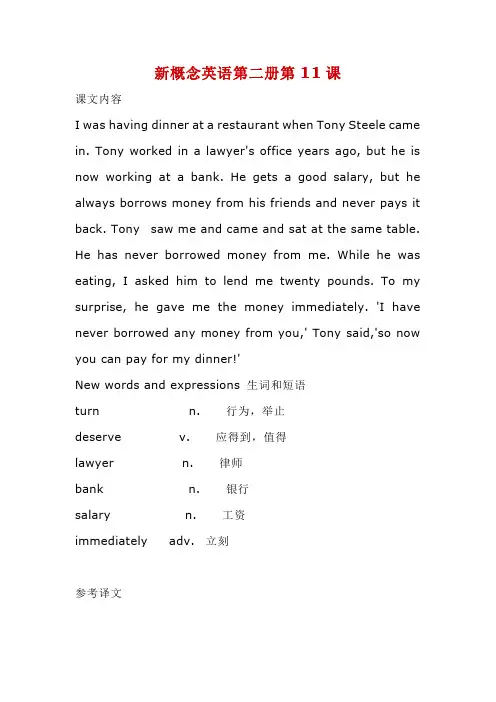
新概念英语第二册第11课课文内容I was having dinner at a restaurant when Tony Steele came in. Tony worked in a lawyer's office years ago, but he is now working at a bank. He gets a good salary, but he always borrows money from his friends and never pays it back. Tony saw me and came and sat at the same table. He has never borrowed money from me. While he was eating, I asked him to lend me twenty pounds. To my surprise, he gave me the money immediately. 'I have never borrowed any money from you,' Tony said,'so now you can pay for my dinner!'New words and expressions 生词和短语turn n. 行为,举止deserve v. 应得到,值得lawyer n. 律师bank n. 银行salary n. 工资immediately adv. 立刻参考译文我正在一家饭馆吃饭,托尼.斯蒂尔走了进来。
托尼曾在一家律师事务所工作,而现在正在一家银行上班,他的薪水很高,但他却总是向朋友借钱,并且从来不还。
托尼看见了我,就走过来和我坐到一张桌子前。
他从未向我借过钱,但他吃饭时,我提出向他借20英镑。
令我惊奇的是,他立刻把钱给了我。
“我还未向你借过钱。
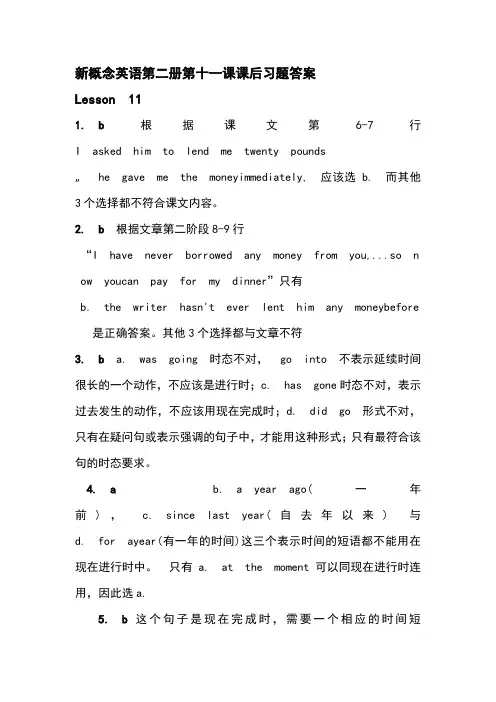
新概念英语第二册第十一课课后习题答案Lesson 111. b根据课文第6-7行I asked him to lend me twenty pounds…he gave me the moneyimmediately, 应该选b. 而其他3个选择都不符合课文内容。
2. b根据文章第二阶段8-9行“I have never borrowed any money from you,...so n ow youcan pay for my dinner”只有b. the writer hasn't ever lent him any moneybefore是正确答案。
其他3个选择都与文章不符3. b a. was going 时态不对,go into 不表示延续时间很长的一个动作,不应该是进行时;c. has gone时态不对,表示过去发生的动作,不应该用现在完成时;d. did go 形式不对,只有在疑问句或表示强调的句子中,才能用这种形式;只有最符合该句的时态要求。
4. a b. a year ago(一年前), c. since last year(自去年以来) 与d. for ayear(有一年的时间)这三个表示时间的短语都不能用在现在进行时中。
只有 a. at the moment可以同现在进行时连用,因此选a.5. b这个句子是现在完成时,需要一个相应的时间短语。
a. last week 不能作现在完成时的的时间状语;后面缺少表示时间的名词;d. A week ago 也不能做现在完成时的时间状语;只有b. Up tillnow(到目前为止)能同现在完成时连用,所以选b.6. c 问“多少钱”需要用表示不可数的疑问词来提问。
a. how many (多少)是对可数的事物或人提问的;b. how不能对名词(钱)提问,只能问方式或状态d. how few也不能对钱提问,只能修饰可数名词;只有c. how much 是针对不可数的事物提问的,问“多少钱”,只能用how much提问,所以选c.7. c a. want to 不合乎题目意思;b. want语法不对,也不符合题目意思;d. you want to 语序错误;只有c. want you to 最合乎语法和题目意思。
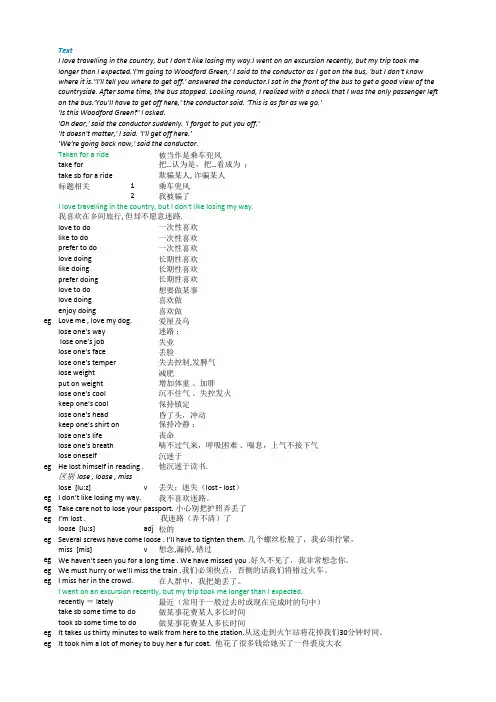
TextI love travelling in the country, but I don't like losing my way.I went on an excursion recently, but my trip took melonger than I expected.'I'm going to Woodford Green,' I said to the conductor as I got on the bus, 'but I don't know where it is.''I'll tell you where to get off.' answered the conductor.I sat in the front of the bus to get a good view of the countryside. After some time, the bus stopped. Looking round, I realized with a shock that I was the only passenger left on the bus.'You'll have to get off here,' the conductor said. 'This is as far as we go.''Is this Woodford Green?' I asked.'Oh dear,' said the conductor suddenly. 'I forgot to put you off.''It doesn't matter,' I said. 'I'll get off here.''We're going back now,' said the conductor.Taken for a ride 被当作是乘车兜风take for 把…认为是,把…看成为;take sb for a ride 欺骗某人, 诈骗某人标题相关 1乘车兜风2我被骗了I love travelling in the country, but I don't like losing my way.我喜欢在乡间旅行, 但却不愿意迷路.love to do一次性喜欢like to do一次性喜欢prefer to do一次性喜欢love doing长期性喜欢like doing长期性喜欢prefer doing长期性喜欢love to do 想要做某事love doing 喜欢做enjoy doing 喜欢做eg Love me , love my dog. 爱屋及乌lose one’s way 迷路;lose one’s job 失业lose one’s face 丢脸lose one’s temper 失去控制,发脾气lose weight减肥put on weight 增加体重、加胖lose one’s cool 沉不住气、失控发火keep one’s cool保持镇定lose one’s head 昏了头,冲动keep one’s shirt on 保持冷静;lose one’s life丧命lose one’s breath 喘不过气来,呼吸困难、喘息,上气不接下气lose oneself 沉迷于eg He lost himself in reading . 他沉迷于读书.区别 lose , loose , misslose [lu:z] v丢失;迷失(lost - lost)eg I don’t like losing my way.我不喜欢迷路。

新概念英语第二册课后答案第十一课Lesson 111. b根据课文第6-7行I asked him to lend me twenty pounds… he gave me the money immediately, 应该选b. 而其他3个选择都不符合课文内容。
2. b根据文章第二阶段8-9行“I have never borrowed any money from you,...so now you can pay for my dinner”只有b. the writer hasn't ever lent him any money before 是准确答案。
其他3个选择都与文章不符3. ba. was going 时态不对, go into 不表示延续时间很长的一个动作,不应该是实行时;c. has gone 时态不对,表示过去发生的动作,不应该用现在完成时;d. did go 形式不对,只有在疑问句或表示强调的句子中,才能用这种形式;只有b. went最符合该句的时态要求。
4. ab. a year ago(一年前),c. since last year(自去年以来) 与d. for a year(有一年的时间)这三个表示时间的短语都不能用在现在实行时中。
只有a. at the moment 能够同现在实行时连用,所以选a.5. b这个句子是现在完成时,需要一个相对应的时间短语。
a. last week 不能作现在完成时的的时间状语;c. Since后面缺少表示时间的名词;d. A week ago 也不能做现在完成时的时间状语;只有b. Uptill now(到当前为止)能同现在完成时连用,所以选b.6. c问“多少钱”需要用表示不可数的疑问词来提问。
a. how many (多少)是对可数的事物或人提问的;b. how不能对名词(钱)提问,只能问方式或状态d. how few也不能对钱提问,只能修饰可数名词;只有c. how much 是针对不可数的事物提问的,问“多少钱”,只能用how much提问,所以选c.7. ca. want to 不合乎题目意思;b. want语法不对,也不符合题目意思;d. you want to 语序错误;只有c. want you to 最合乎语法和题目意思。
新概念英语二册重点单词课文二册一期(L1-20)重点课文:L1 L4 L10 L16 L20重点单词:L1:theatre 剧院,戏院;seat座位;play戏;loudly大声地;angry生气的;attention注意;bear容忍;rudely无礼地,粗鲁地L2:until直到;ring(铃、电话等)响;repeat重复L3:send寄送;museum博物馆;public公共的;friendly友好的;waiter服务员,招待员;lend借给;decision决定L4:exciting令人兴奋的;receive接到收到;different不同的;abroad在国外L5:message信息;service业务服务L6:pocket衣服口袋;call拜访,光顾L7:expect期待,等待L8:competition比赛,竞赛;wooden木头的L9:crowd人群;shout喊叫;refuse拒绝;laugh笑L10:musical音乐的;recently最近;damage损坏;shock使不悦或生气,震惊;allow允许,让L11:immediately立刻L12:luck幸运,运气;proud自豪,important重要的L13:group小组,团体L14:amusing好笑的,有趣的;experience经历;wave招手;replay回答;language语言;journey旅行L15:nervous精神紧张的;afford负担得起;weak弱的L16:park停放汽车;traffic交通;sign指示牌;fail无视,忘记L17:L18L19:pity令人遗憾的事;return退回L20:catch抓到;waste浪费;realize意识到二册二期(L21-40)重点课文:L25 L27 L31 L35 L38重点单词:L21:reason原因L22:dream做梦,梦想;age年龄;throw扔,抛L23:complete完成;strange奇怪的L24:manage经理;complain抱怨;honesty诚实L25:several几个;foreigner外国人;wonder感到奇怪L26:pretend假装;material材料;notice注意到;whether是否;hang悬挂,吊L27:smell闻起来;wonderful极好的;comfortable舒适的,安逸的;heavily大量的L28:trouble麻烦;effect结果,效果L29:lonely偏僻的,人迹罕至的;desert废弃L30:towards朝,向;nearly几乎;sight眼界,视域L31:save积蓄,employ雇佣L32:once曾经,以前;simply仅仅;arrest逮捕L33:darkness黑暗;explain解释,叙述;storm暴风雨;struggle挣扎L34L35:regret后悔;far非常;fright害怕L36: record记录;succeed成功;train训练;intend打算L37: hold召开;capital首都;design设计L38: except出了L39: successful成功的;patient病人;alone独自的L40: hostess女主人;fix凝视二册三期(L41-60)重点课文:L44 L46 L51 L54 L57重点单词:L41:rude无礼的;remind提醒L42:continue继续;difference差别L43:lie处于;serious严重的;seem似乎,好像L44:forest森林;picnic野餐;breath呼吸L45:wallet皮夹;钱夹;villager村民L46:woolen羊毛的;discover发现;admit承认L47:thirsty贪杯的;furniture家具;suggest暗示;accept接受L48:collect搜集L49:tired厌烦的;real真正的;owner主人;sweep扫,刮L50:L51:diet节食;forbid禁止;strict严格的L52:space空间;actually实际上L53:cause引起,原因;examine检查;solve解决L54:mix混合,拌和;annoying恼人的;recognize认出,听出;persuade说服,劝说L55:invent发明;finally最后;confident有信心的;value价值L56:sound声音;speed疾驶L57:punish惩罚L58:increase增加;plant种植L59:expert专家;habit习惯L60:future未来二册四期(L61-80)重点课文:L62 L64 L70 L75 L78重点单词:L61:billion10亿;astronaut宇航员;distant遥远的L62:control控制;surrounding周围的;century世纪L63:admire赞美,钦佩;close亲密的L64:double双的;fear害怕;European欧洲的L65:Christmas圣诞节;present礼物;weigh重;fortunate幸运的L66:survey调查;rescue营救;imagine想象L67:active活动的;manage设法;escape逃脱;alive活着的L68:avoid避开;insist坚持做L69:instruct命令,指示;suppose假设L70:remark评语,言论;safety安全地带L71:official官员,行政人员;check检查L72:racing竞赛;average平均的L73: shame惭愧,羞耻L74: fan狂热者,迷L75: thick厚的;signal信号;helicopter直升飞机;scene现场;survivor幸存者L76: fool傻瓜;leading主要的;present目前的;champion冠军;studio播音室L77: temple庙;disease疾病;last持续;prove显示出L78: concentration集中,专心;suffer受苦,受害;temper脾气;urge力劝,怂恿;satisfaction 满意,满足;delighted欣喜的L79: frightened害怕,担惊;curious急于了解的,好奇的L80:palace宫殿;exhibition展览;various各种各样的;display展览;college学院二册五期(L81-96)重点课文:L81 L85 L89 L93重点单词:L81:rapidly迅速地;uniform制服;shoulder肩L82:sailor海员;creature动物,生物L83:defeat打败;opponent反对者,对手;progressive进步的L84:agreement协议;pressure压力,麻烦;volunteer自动提出,自愿;gratitude感激;object 不赞成,反对L85:inform告诉,通知;contribute捐助,援助;patience耐心;encouragement鼓励;honour 敬意;total总数;devote致力于L86:dismay沮丧;gently缓慢地,轻轻地L87:employer雇主;confirm确认,证实;truth真相L88:surface地面,表面L89:comedy喜剧;queue排队;dull枯燥的,无味的;advertiser报幕员L90:terrifying吓,使恐怖;variety品种;factor因素L91:balloon气球;spy侦察L92:tone语调,腔调L93:statue雕像;support支持,支撑;transport运送L94:L95:heaven天堂L96:festival 节日。
新概念英语第⼆册课后习题答案详解Lesson 121. c根据课⽂第3-4⾏Topsail is a famous little boat. It has sailed across the Atlantic many times, 只有c能够说明为什么Topsail is famous ,⽽其他3个选择都不符合逻辑。
2. c根据课⽂最后⼀句He will take part in an important race across the Atlantic, 只有c. will be in the race across the Atlantic 同这句意思相同,⽽其他3个选择课⽂中都没有提到。
3. a本句是个关系从句,需要⼀个相应的关系代词引导。
b. whose his 不合乎语法,这两个词不能⽤在⼀起;c. his 不是关系代词;d. of whom 不合乎题⽬意思;只有a. whose 是关系代词,符合题⽬意思,所以应该选a.4. d本句中的Portsmouth是⼀个地名(港⼝),在某个地⽅⼀般要⽤介词in或at, at 是指在⼩的地点或空间,因此只能选d, at. 其他3个选择都不能表⽰在某个地点。
5. d只有d. the name of which 符合语法,其他3个选择都不对。
6. a要选出与前⾯句⼦中的plenty of (⾜够的)意思相同的词。
b. almost enough(⼏乎是⾜够的)意思不够准确c. less than enough(不充⾜的)意思相反,d. hardly enough(⼏乎不够)意思相反,只有a. enough(⾜够)是plenty of 的同义词。
7. da. say him goodbye 不符合语法;b. tell him goodbye 和c. tell goodbye to him 都不符合习惯⽤法,意思上也讲不通;只有d. say goodbye to him 最符合语法。
【导语】新概念英语作为家喻户晓的经典之作,它有着全新的教学理念,有趣的课⽂内容及其全⾯的技能训练,为⼴⼤的英语学习者提供帮助!如果你也想学好英语,⼜怎能错过新概念英语?下⾯为您提供了相关内容,希望对您有所帮助! 课⽂详注 Further notes on the text 1. One good turn deserves another. 礼尚往来。
(1)名词turn的含义之⼀是“(帮助或损害他⼈的)举动”、“⾏为”: Yesterday George did me a good/ an ill turn. 乔治昨天做了⼀件对我有利/不利的事。
He is always ready to do a turn for others. 他总是乐于为他⼈做好事。
(2)deserve的意义为“应受”、“应得(奖赏、惩罚等)”、“值得”,通常为及物动词: His words deserve attention. 他的话值得注意。
Mary deserves the prize. 玛丽应得这个奖。
2. He gets a good salary… 他的薪⽔很⾼…… good在这⾥的意思是“相当⼤/多的”、“相当可观的”: It takes me a good three hours to get there. 我花了整整3⼩时才到达那⾥。
3. …but he always borrows money from his friends and never pays it back. ……但他却总是向朋友借钱,并且从来不还。
(1)连词and在这句话中可解释为“并且”、“另外”(in addition)。
(2)pay在这⾥的意思是“偿还(债务等)”。
pay还可以解释为“付”、“⽀付(价款、账单等)”,如课⽂的最后⼀句话: …so now you can pay for my dinner! ……所以现在你可以替我付饭钱了! pay 既是及物动词也可以是不及物动词: How much did you pay for that dress? 那件⾐服你花了多少钱? I paid the bill. 我付了账。
新东方新概念英语第二册课后习题答案详解/html/2/xiangjie/list_81_2.html第13课、新东方新概念英语第二册课后习题答案详解Lesson 131. b根据课文第3-4行They will be coming…and most of the young people in town will…,只有b. mainly the young people 与课文内容相符合,而其他3个选择都不符合课文内容。
2. d根据文章第7-8行...the police will have a difficult time, they will be trying to keep order.只有d. to prevent trouble(防止麻烦)最符合文章的意思,它说明警察去那的目的,而其它3个选择都表示原因,不能准确表达文章的含义。
3. b需要选同前面句子中的most of (大多数)意思相近的词或短语。
a. A lot(许多)后面应该有of, 与most of 意思不同;c. Some(一些)不是most of 的同义词,语法上也讲不通;d. Many(许多)也不是most of 的同义词,且有语法错误;只有b. Nearly all(几乎所有的)同most of 的意思最接近,也最符合语法。
4. c只有 c. long will they be 最符合语法和题目意思。
a. long they will be 不是疑问句形式,不合乎语法规则;b. they will be 不合乎语法,也不合乎题目意思;d. long they be 不合乎语法。
5. a只有a.in才最接近前面句子中的 during 的含义,而其他3个选择都在意思上讲不通。
6. b只有b. as usual(通常)才能使这个句子意思完整,语法正确,而其他3个选择都不符合习惯用法和语法。
7. b这个句子的主语police(警察)是表示复数意义的名词,因此它后面的谓语动词应该是复数形式的。
Lesson 64 The Channel Tunnel【New words and expressions】(13)56tunnel[ ♦✈⏹●] n. 隧道★tunnel n. 隧道channel n. 海峡(The Channel 英吉利海峡)port [☐♦] n. 港口ventilate[ ♏⏹♦♓●♏♓♦] v. 通风★ventilate v. 通风★ventilation n. 通风Forced Ventilation 强制排风系统(forced [♐♦♦] adj. 被迫的,强迫的,动用武力的)air v. 通风Air the room, please! 给房间通通风chimney[ ♦☞♓❍⏹♓] n. 烟囱sea level[♦♓●♏☎☜✆●] 海平面double[ ♎✈♌●] adj. 双的★double adj. 双的字母W 的读音就是“double u”,意为两个u 构成w .couple,pair 两个a couple of weeksa pair of shoes/socks/glasses 一副眼镜ventilation [ ♏⏹♦♓●♏♓☞☜⏹] n. 通风fear[♐♓☜] v. 害怕★fear v. 害怕①vt. 害怕,畏惧sb. fear doing sth. 害怕做……She fears speaking in public.sb. fear sth. 害怕……I feared darkness.be afraid of 害怕……I am afraid of dogs.be afraid of / fear 人做主语②vt. 恐怕,猜想(比be afraid要正式)fear that… 恐怕……We fear /It is feared/ We‟re afraid that many lives have been lost in the crash.be afraid that… = I am sorry. 恐怕……(婉言谢绝)Can you help me?I am afraid I can't. = I am afraid not.fright / frighten / frightening / frightened / frightfulsth. frighten sb. = sth. scare sb. ……吓了……一跳You frightened/scared me.The doy frightened me.frighten = scare是因某件突然的事情才让某人产生了害怕的情绪,句子后边的部分是人horrify [ ♒❒♓♐♋♓] v. 使恐怖, 使极度厌恶, 惊骇horrified [♊♒❒✋♐♋✋♎] adj. 惊悸的, 带有恐怖感的, 惊骇的invasion[♓⏹♏♓✞☜⏹] n. 入侵,侵略★invasion n. 入侵, 侵略invade [♓⏹♏♓♎] vt. 侵略, 侵袭, 拥挤officially[☜♐✋☞☜●✋ ☎✍✆ ♐] adv. 正式地★officially adv. 正式地official adj. (官方的)正式formally adv. (一般的)正式connect [ ☜⏹♏♦] v. 连接★connect v. 连接connect sth. with/to… 把……和……连接connect A with B (A和B平等)connect A to B (A连到B上去)This road connects the village with/to London.European [ ◆☜❒☜☐♓☎✆☜⏹] adj. 欧洲的★European adj. 欧洲的continent [ ⏹♦♓⏹☜⏹♦] n. 大陆★continent n. 大陆European Continent 欧洲大陆(不包括欧洲岛国)【Text】In 1858, a French engineer, Aime Thome de Gamond,arrived in England with a plan for a twenty-one-miletunnel under the English Channel. He said that it would be possible to build a platform in the centre of theChannel. This platform would serve as a port and arailway station. The tunnel would be well-ventilated iftall chimneys were built above sea level. In 1860, a better plan was put forward by an Englishman, WilliamLow. He suggested that a double railway-tunnel shouldbe built. This would solve the problem of ventilation, forif a train entered this tunnel, it would draw in fresh airbehind it. Forty-two years later a tunnel was actually begun. If, at the time, the British had not feared invasion, it would have been completed. The world had to wait almost another 100 years for the Channel Tunnel. It was officially opened on March 7,1994, finally connecting Britain to the European continent.参考译文1858年, 一位名叫埃梅·托梅·德·干蒙的法国工程师带着建造一条长21英里、穿越英吉利海峡的隧道计划到了英国. 他说, 可以在隧道中央建造一座平台, 这座平台将用作码头和火车站. 如果再建些伸出海面的高大的烟囱状通风管, 隧道就具备了良好的通风条件. 1860年, 一位名叫威廉·洛的英国人提出了一项更好的计划. 他提议建一条双轨隧道, 这样就解决了通风问题. 因为如果有一列火车开进隧道, 它就把新鲜空气随之抽进了隧道. 42年以后, 隧道实际已经开始建了. 如果不是因为那时英国人害怕入侵, 隧道早已建成了. 世界不得不再等将近100年才看到海峡隧道竣工. 它于1994年3月7日正式开通, 将英国与欧洲大陆连到了一起.【课文讲解】[00:13.9-00:27.1]In 1858, a French engineer, Aime Thome de Gamond, arrived in England with a plan for a twenty-one-mile tunnel under the English Channel.1858年, 一位名叫埃梅·托梅·德·干蒙的法国工程师带着建造一条长21英里、穿越英吉利海峡的隧道计划到了英国.plan for +名词/动名词……的计划twenty-one-mile 加连字符,用单数,作定语[00:27.1-00:33.2] He said that it would be possible to build a platform in the centre of the Channel.他说, 可以在隧道中央建造一座平台,[00:33.2-00:38.8]This platform would serve as a port and a railway station.这座平台将用作码头和火车站.serve as… =serve for… 起……作用,用作……,充当……It will serve as a swimming pool.This sofa can serve as/for (a) bed.[00:38.8-00:45.4]The tunnel would be well-ventilated if tall chimneys were built above sea level.如果再建些伸出海面的高大的烟囱状通风管, 隧道就具备了良好的通风条件.[00:45.4-00:53.1] In 1860, a better plan was put forward by an Englishman, William Low.1860年, 一位名叫威廉·洛的英国人提出了一项更好的计划.put forward (plan/suggestion) 提出(计划、建议等)You know they wouldn‟t accept your plan. Why did you put it forward?[00:53.1-00:58.0]He suggested that a double railway-tunnel should be built.他提议建一条双轨隧道,suggest①vt. 暗示,用法与其他的词相同②vt. 建议,用虚拟语气,后接动词是要用-ing形式,后接that从句采用一种固定的用法“should+动词原形”(should 可省略)I suggested (that) he (should) go home. (that, should 都可省略)He suggested that I should go with him. 他建议我一定要跟他去.insist作“坚持”讲时用法同suggestHe insisted that I should stay to lunch. 他坚持要我留下来吃晚饭.[00:58.0-01:08.0]This would solve the problem of ventilation, for if a train entered this tunnel, it would draw in fresh airbehind it.这样就解决了通风问题. 因为如果有一列火车开进隧道, 它就把新鲜空气随之抽进了隧道.draw in 吸进,如用bring没有draw in 形象、贴切[01:08.0-01:13.1] Forty-two years later a tunnel was actually begun.42年以后, 隧道实际已经开始建了.[01:13.1-01:21.4] If, at the time, the British had not feared invasion, it would have been completed.如果不是因为那时英国人害怕入侵, 隧道早已建成了.虚拟语气(非真实条件句)中,与现在事实相反,从句用一般过去时;与过去事实相反,从句用过去完成时,此时主句格式为would have done,would/could/should 都可以情态动词加have done 表示对过去的推测,如must have done,can't have done等[01:21.4-01:27.8]The world had to wait almost another 100 years for the Channel Tunnel.世界不得不再等将近100年才看到海峡隧道竣工.wait for sb.wait (for) some timesI have waited five minutes. (for 可不要)I have waited for you (for) five minutes.I have waited five years for you.[01:27.8-01:37.8]It was officially opened on March 7,1994, finally connecting Britain to the European continent.它于1994年3月7日正式开通, 将英国与欧洲大陆连到了一起.【Summary writing】1 Who planned to build a tunnel under the EnglishChannel in 1858? How would it be ventilated? (Thetunnel, which…)4 Did work begin forty-two years later or not? Why was it stopped? (Though…because)5 When was the Channel Tunnel officially opened?(However)1 先行词, which : 非限定性定语从句The tunnel, which a French engineer planned to buildin 1858, would be ventilated if tall chimmeys were built above sea level.4 Though it was begun (work begin forty-two yearslater), it was stopped because…5 However 起了副词的作用,后面可以直接加一个句子【Composition】1 The English Channel separates Britain from Europe. The country has not been invaded since1066. (Thanks to…which)2 Modern warfare is far more complex. Such fears no longer exist.(However, now that…)3 Britain benefits enormously from a Channel Tunnel. Europe benefits enormously from a Channel Tunnel. (Both…and)1 thanks to 幸亏(to是介词)Thanks to the English Channel which separates British from Europe, the…2 now that 即使;既然Howwever, now that moden warfare is far morecomplex ,such fears no longer exist.即使现代战争越来越复杂了,然而这样的害怕都已经不存在了3 Both Britain and Europe benefit... (注意benefit不能加s)benefit [ ] n. 利益,好处;vt. 有益于,有助于;vi. 受益【Key structures】第3类条件句第3类条件句是在if从句里设想纯粹想像的事情,在主句里讲述想像的结果,谈的是没有或永远不可能有的结果,指的是过去没有过的事情。
新概念英语第二册第11课摘要:一、新概念英语第二册第11 课概述二、课文内容概述三、课文中的重要词汇与短语四、课文的语法要点五、学习课文的意义与启示正文:一、新概念英语第二册第11 课概述《新概念英语》第二册第11 课,标题为“One Good Turn Deserves Another”,意为“礼尚往来”。
这篇课文主要通过一个故事,让学习者了解在英语交际中如何表达礼尚往来的观念。
二、课文内容概述故事发生在一家餐厅,主人公我正在餐厅吃饭,这时托尼·斯蒂尔走了进来。
托尼和我并不熟悉,但他看到我后却主动邀请我共进晚餐,并表示他来买单。
我感到非常意外,但也欣然接受了他的邀请。
在用餐过程中,我们愉快地交谈,建立了友谊。
最后,托尼表示希望我下次也能请他吃饭,这种礼尚往来的精神让我深感敬佩。
三、课文中的重要词汇与短语1.Good turn:礼尚往来2.Deserve:应得,值得3.Another:另一个,又一4.Paid:付款,支付5.Dinner:晚餐6.Came in:进来7.Worked in:在...工作8.A restaurant:一家餐厅9.Answer:回答,答复10.Question:问题四、课文的语法要点1.一般过去时:表示过去某个时间里发生的动作或存在的状态。
2.疑问词和疑问句:用于提问的词和句子,如who, what, where, when, why 等。
3.祈使句:表示请求、命令或建议的句子。
4.动词短语:由动词和其他词组成的短语,表示一个动作或状态。
五、学习课文的意义与启示通过学习这篇课文,我们可以了解到在英语交际中如何表达礼尚往来的观念,以及如何用英语讲述一个完整的故事。
此外,这篇课文还可以帮助我们学习一些常用的英语词汇和语法结构,提高我们的英语水平。
新概念英语第二册第十一课课文详解
一、生词
1、turn n. 行为,举止
behavior:行为,举止
pay attention to your behavior
turn:对人有影响力的行为
2、deserve v. 应得到,值得
He deserves praise.他应该得到表扬
Yor deserve the best.你应该得到的
deserve + n.
promotion:提升
He deserved a promotion.
deserve to do:应该...
She deserved to be punished.
Good work deserves good pay.
3、lawyer n. 律师
lawyer's office:律师事务所
4、bank n. 银行
rob the bank:抢银行
bank在英语中有很多种意思,除了表示银行外,还可表示(贵重物品、信息等的)储库,以及河岸、坡地等。
例如:My father works in a bank.
我父亲在一家银行工作。
Our school is located on the south bank of the river.
我们的学校在河的南岸。
短语扩展:bank blance 银行存款余额
break the bank ①赌博赢的钱比庄家的赌本还多;②花费不起bank-book 银行存折
bank还可作动词,表示将钱存进银行。
例句:Where do you bank?
你把钱存有哪一家银行?
短语扩展:bank with sb. /sth. (在某银行中)有账户
bank on sb. /sth. 寄希望于某人或某物
5、salary n. 工资
pay:工资(salary+wage) 通用
salary:工资(月薪,年薪)……有固定工作或管理阶层
wage:工资(按小时,周计算的)……不稳定的工作
bonus:奖金,分红
collet:搜集,领取collect salary/wage:领工资
salary、income、pay、wage几个词的区别
salary是指非体力劳动者所得到的工资、薪水,通常按月,有时按季度或年结算,而且是指基本工作。
income是比较口语化的说法,表示总收入,既可用于个人,也可用于企业。
pay是最一般的用语,是指针对劳动所支付的报酬,常可代替其他三个词。
但pay也有其专用的场合,它特指军队里的"薪饷"。
wage一般用以指按小时或按日计酬的工资,它发给的对象是蓝领阶级,即工厂或码头等地的工人。
此字常用复数形式,尤其指个人收入的时候。
例句:I received my salary for last month yesterday.
昨天我领了上个月的工资。
The total annual income of this family is 8000 yuan.
这个家庭的年总收入是8000元。
6、immediately adv. 立刻
at once:立刻,马上
right now:现在
right away:=at once,immediately 立刻,马上
7、borrow v. (向某人)借某物;借用
borrow、lend、keep、return、pay back等一系列跟借相关的词解析
lend,borrow,keep的区别我们在第二册第三课知识点里有提及到,今天我们再来复习看看。
lend,borrow两者都可表示"借",但是 borrow 指"借入",而lend 则指"借出",两者其实是一对反义词,而不是同义词。
如:
I borrowed this book from the library.。